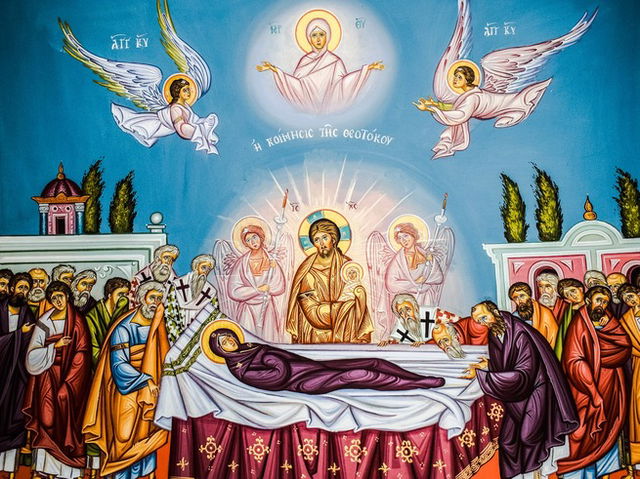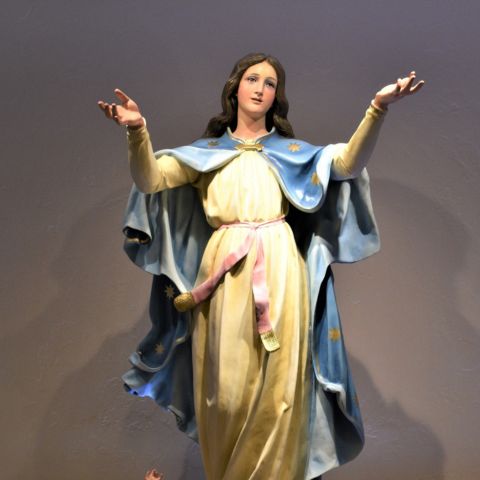- Calendar
- Calendar 2025
- August
- Assumption of Mary
Assumption of Mary
Catholics in the United States celebrate the Feast of the Assumption of Mary on August 15th.
It is believed to be the day Mother Mary, the mother of Jesus Christ, was physically and spiritually taken into heaven to be with her son forever.
It is a Holy Day of Obligation which means that churchgoers are obligated to attend mass on this day.
The Tale of the Assumption of Mary
There was a rising concern about Mary's unknown fate during the 4th century. Three major beliefs about how she met her end are:
- she died as a martyr,
- she died a peaceful death,
- she did not die.
Eventually, Bishop Epiphanius of Salamis wrote that no one knows for certain what her end was.

By the 8th century, it was established by believers that the Apostles witnessed Mary passing away.
But, after opening her tomb, St. Thomas found it empty and this led the Apostles to believe that her body ascended to heaven similar to Jesus.
Early traditions state that this happened in Jerusalem, but recent versions of the story say that her assumption took place in Ephesus at the House of the Virgin Mary.
Christians have been celebrating the Assumption of Mary since the 5th century. However, it became an official feast of the Catholic Church in the 8th century after the confirmation of Pope Leo IV.
In 1950 it was defined as a dogma of the Catholic Church by Pope Pius XII.
The story of the Assumption of Mary has been a very significant part of Catholic tradition and doctrine from the early Christianity centuries.
Pope Pius XII officially preached the ideology of the Assumption in 1950. It is said that Mary's sinless and pure life along with her role as the Mother of Jesus gave her a special place in heaven.
What is the Historic Significance
The history of the Assumption of Mary is rooted in centuries of Christian belief and devotion. While the Assumption is not explicitly mentioned in the canonical Scriptures, its origins can be traced back to early Christian traditions and writings.
The earliest references to the Assumption can be found in non-canonical writings, such as the apocryphal accounts known as the "Transitus Mariae" (Passing of Mary). These writings describe Mary's passing from earthly life to heavenly glory. Although these texts are not considered part of the official canon, they played a significant role in shaping the belief in Mary's Assumption.
Throughout the early centuries of Christianity, a deep veneration for Mary developed, driven by her unique role as the Mother of Jesus and her intimate connection to the mysteries of the faith. This veneration led to the gradual development of Marian theology, which explored Mary's virtues, her participation in the life and ministry of Jesus, and her special place in salvation history.
Byzantine tradition played a crucial role in shaping the understanding of the Assumption. Byzantine theologians, such as St. Andrew of Crete and St. John Damascene, contributed to the development of the feast and its theological significance. The Byzantine Church celebrated the Dormition of the Theotokos, which corresponds to the Assumption, even before it became widely observed in the West.
The Assumption of Mary began to be celebrated liturgically in various Christian communities, particularly in the East, as early as the 5th century. The feast focused on the belief that Mary, in her body and soul, was taken up into heaven by God's divine intervention. This belief reflected the understanding of Mary's unique role in God's plan and her exalted position as the Mother of God.
In the West, the celebration of the Assumption gained prominence during the Middle Ages. Artworks and devotional practices centered around Mary's Assumption flourished during this period, depicting her ascent into heaven, often accompanied by angels and crowned as the Queen of Heaven.
How the Assumption of Mary is Observed
The Assumption of Mary adds to the belief in the hope of eternity. Over the centuries, people have celebrated this hope through music, literature, and art.
Today, the Assumption of Mary is celebrated as a solemn feast in the Catholic Church and holds deep significance in Catholic theology and spirituality. It serves as a reminder of Mary's special role in God's plan of salvation and her intercessory power as a loving mother to all believers. The Assumption continues to inspire devotion and acts as a source of hope and consolation for countless faithful worldwide.
Several cathedrals and churches worldwide dedicated altars and chapels to Mother Mary in honor of this day.
Her role in humanity's salvation is honored through mass in the Catholic Churches. There are also processions in her name and special prayers offered to her.
Families get together on this day to cherish it with traditions and food.
In Cleveland, Ohio there is a four-day festival to celebrate this feast day.
This day serves as a reminder to Catholics and people who believe in it that our life on earth is short and that joining Mother Mary and the saints in heaven is our ultimate goal.
Hence, the best celebration would be living a faithful, honorable, charitable, and hopeful life.

Other Celebrations
-
Jan 01 Wed
-
Jan 25 Sat
-
Feb 07 Fri
-
Mar 01 Sat
-
Apr 19 Sat
-
Nov 01 Sat

Assumption of Mary - Next years
Saturday, 15 August 2026
Sunday, 15 August 2027
Tuesday, 15 August 2028











